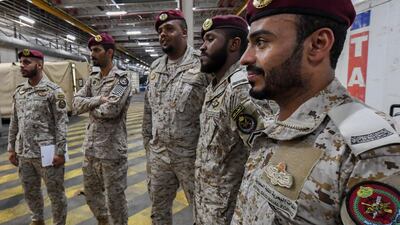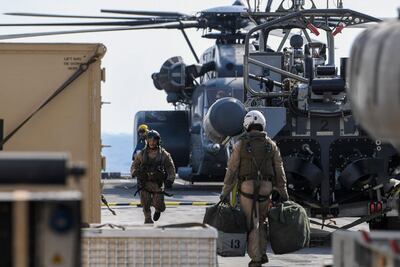The US is training its Gulf allies to protect navigation in the region's troubled waterways, as it seeks to build an alliance to contain Iran.
Washington's three-week International Maritime Exercise, or IMX, started on October 21 and was in response to attacks on commercial vessels in the Gulf starting in May.
Washington and other western powers blamed the incidents on Iran, which has denied any involvement.
On Tuesday, the US invited international media to see part of the IMX, the second-largest maritime exercise of its kind.
The manoeuvres involve 5,000 personnel, 40 vessels and 17 aircraft sent to the strategic waterway from 50 countries.
"This is the first time we are taking part in the IMX," Ali bin Shreidi, the head of a Saudi naval de-mining team, told AFP.
He was aboard the Cardigan Bay, a British Royal Fleet Auxiliary landing ship 65 kilometres off the coast of Bahrain.
The officer and his three-member team were taking part "to increase our capabilities and share our expertise in fighting mines, in order to protect navigation", he said.
In June, the US Navy said a mine resembling an Iranian weapon was used in an attack on the Japanese-owned Kokuka Courageous tanker, as it passed through the Gulf of Oman.
Then in July, Iran's Revolutionary Guard Corps seized a British-flagged oil tanker, holding it for more than two months before releasing it.
"One of the biggest reasons for us being out here is to build international relations," said US Navy Lt Jonathan Phares who was among 300 personnel from the US, France and the Gulf on the Cardigan Bay.
Those aboard showed off diving gear, underwater imaging kit and speedboats during a tour of the vessel, while others demonstrated mine-detection equipment.
But they were tight-lipped about tension with Iran.
"We've been used more than once in the past," a US mines expert said.
The US formed a naval coalition to protect navigation in a waterway that is crucial to global oil supplies.
Bahrain, which hosts the US Navy's Fifth Fleet, joined the naval coalition in August. Saudi Arabia and the UAE joined in September.
The UK and Australia are the main western countries that sent warships to escort commercial shipping in the Gulf.
Animosity between Tehran and Washington and its allies has soared since the US abandoned a deal on curbing Iran's nuclear programme last year and reimposed heavy sanctions.
On September 14, drone strikes hit two Saudi oil centres, temporarily knocking out half of the kingdom's oil production.
The attacks were claimed by Yemen's Houthis who are battling a Saudi-led coalition, but Washington and Riyadh blamed Iran, saying the strikes were carried out with missiles and drones too sophisticated to be made by the Iran-backed rebels.
Most European states have declined to take part in the naval coalition, fearful of undermining efforts to save the nuclear accord with Iran, which was badly weakened by the US withdrawal.


